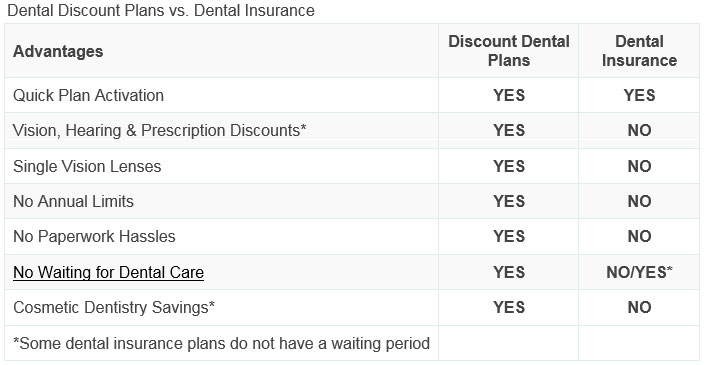Find affordable dental plans in your area
ENTER YOUR ZIP CODE TO GET STARTED
- Free Dental plan w/MediCare. See if you qualify
- Dental Insurance Plans available from $2/day
- Dental Discounts Plans available from .45 cents/day

Find the right plan – Talk to a Specialist today!
What’s the difference between dental insurance and dental discount plans?
They can both be useful in terms of reducing your total dental costs, but they vary significantly in terms of the benefits you get and how much you pay for the coverage.

Dental insurance plans work like health insurance. You pay a monthly premium. After the deductible is reached (assuming there is a deductible; dental HMOs often have no deductible), the insurance pays all or part of your qualified dental expenses, up to a stated maximum. The insurance company generally pays the dentist directly for its share of your dental expenses, although dental indemnity plans may require you to pay the bill upfront and then seek reimbursement from the insurance plan.
Dental insurance plans typically have deductibles, co-pays, waiting periods, and/or policy maximums. A typical deductible might be $25 to $100 per person annually. After that, the plan will provide benefits that vary depending on the type of care received. Preventive care is often covered in full or nearly in full. But the patient will typically have to pay a portion of the charge for more extensive care. On some plans, the patient pays a percentage of the total cost, while other plans have a schedule of benefits with set amounts that the patient will pay for various procedures. On most dental plans, the annual benefit maximum generally ranges from $1,000 to $2,000, although there are outliers on both ends.
Most dental plan have three levels of coverage, preventive (Exam, Cleaning, and X-rays), basic (Fillings, and Simple Surgical Extractions), and major (Root Canals, Dentures, Bridges). Most dental plans pay 100% of preventive with no deductible. They usually pay for 80% of basic services after deductible, and 50% of major services after deductible is met.
Dental HMOs require the insured to select a primary care dentist from the plan’s provider network, and all care must be coordinated through that dentist; out-of-network dental care typically wouldn’t be covered at all under an HMO. Dental HMOs generally don’t have a benefit maximum; instead, they’ll have a set copay amount that the insured pays for each procedure. If you’re purchasing your own dental plan, most of the available options will have an annual benefit maximum.
Dental PPOs allow insureds to select from any dentist in the provider network, and most will also provide partial benefits if the insured seeks care from a dentist who isn’t in the network. Dental PPO plans typically have a deductible and an annual benefit maximum, and cover a percentage of each dental procedure based on whether it’s classified as preventive (e.g. x-rays, cleanings), basic (e.g. fillings, root canals, extractions), or major (e.g. crowns, implants, dentures, oral surgery).
Dental indemnity plans allow insureds to see any provider, with no network restrictions. Dental indemnity plans will pay a pre-determined percentage of the “usual and customary” charges for a given procedure, which means you’ll pay more if you visit a dentist who charges more than the “usual and customary” amount. Since there’s no network for an indemnity plan, dentists are not required to limit their fees based on a network contract. Indemnity plans typically have a deductible and an annual benefit maximum, just like PPO plans.
Typical dental insurance premiums are $20-$65 per month for an individual and $50-$150 for a family, but they vary considerably based on the type and scope of coverage. If you’re buying the plan on your own, you’ll pay the full cost yourself.
Dental discount plans differ from dental insurance mainly because they DON’T pay any dental expenses for you. Instead, they provide discounted prices from participating dentists.
There are generally no deductibles, no waiting periods, and no annual maximums. Typical discounts range from 10 to 60 percent for normal dental work. Plans cost as little as $100 annually for individuals and $150 for families.
If you know you’re going to need extensive dental work, a dental insurance plan with benefit caps and waiting periods might not provide much help. But a dental discount plan could save you significantly more than the cost of its membership fees, particularly if you need several dental procedures during the year. Since membership benefits for an individual are typically less than $150 per year, a member would come out ahead with even small discounts on a few significant dental procedures. But it’s important to keep in mind that even with a dental discount plan, you’ll still pay a significant chunk of the cost of dental work, particularly if you need extensive work done.
If you’re considering a discount dental plan, contact some of the dentists in the network and discuss actual charges with them to determine how much you’ll save by using the plan.
Which Dental Plan works best for you?
Both dental insurance and dental savings plans, an alternative to dental insurance premiums, can help you maintain your oral health and overall wellness. Which option you choose is an individual decision, which should be based on your dental care needs, budget, and preferences.

Cost Of Dental Insurance
The typical cost of an individual dental insurance policy can range from $350 – $700 a year. For a family, the cost is around $1,000 – $2,000 annually. Dental savings plans are typically priced between $125 – $200 for individuals and $170 – $300 for families. Dental insurance is usually billed monthly, while dental savings plans are paid annually. Exceptions can sometimes be made regarding billing times if requested.
Dental Insurance Reimbursements
Some individuals with dental insurance policies complain about the process of getting reimbursed for their dental care. Their issues include having to manage written claims procedures, exclusions on pre-existing conditions, and waiting periods for major procedures.
Dental insurance plans will frequently refuse to cover certain procedures or impose long waiting periods. For example, many dental insurance policies have exclusions on pre-existing conditions and may require a 6 to 18 month waiting period before paying for major dental treatment. Conversely, most discount dental plans are free of these limitations and activate within 3 business days, allowing plan members to join and start saving on their dental care as quickly as possible. Additionally, select discount dental plans offer significant savings on dental specialties, such as orthodontics and teeth whitening, while dental insurance policies very rarely cover these procedures.
Dental savings plans do not reimburse members, instead members pay a discounted rate at the dentist. There are no pre-existing condition exclusions or waiting periods to get care.
When compared against each other…
it’s easy to conclude that dental savings plans are the best buy. But it’s important to consider your (and your family’s needs, if you are purchasing a family plan) carefully first.
A good place to start is at your dentist, assuming you have one that you would prefer to continue seeing. Find out what type of plans your dentist accepts and recommends.

When it comes to paying for dental services, most people have three choices:
Purchase dental insurance, buy a dental savings plan, or pay for all dental services out of pocket. To decide which option is best for you, here is the information you need to compare dental insurance to a dental savings plan.
Benefits of Dental Savings Plan
Dental savings plans typically cost less than dental insurance plans. You can save up to 60 percent of the cost for many dental procedures, and there are no deductibles or waiting periods. Your current dentist probably works with a variety of savings plans, so call the office to learn which plans your dentist accepts. There are no health restrictions that prevent you from qualifying for a dental savings plan.
Disadvantages of Dental Savings Plan
The most significant drawback to a dental savings plan is that you pay out-of-pocket for all of your dental procedures, although at a discounted price. That means you must be able to afford the discounted rate at the time of service to be able to get the dental work you need to be completed. Although you get a discounted rate, this can make it difficult to get the services you need.
Benefits of Dental Insurance
The most significant advantage of having dental insurance is the savings it can provide. While the cost of cleanings and checkups may be minimal ($127 on average), the expense of having more intensive procedures completed can increase quickly. In the case of pricey non-routine dental care like a root canal, dentures or implants, the high cost can be mitigated by dental insurance, so you don’t have a massive effect on your finances.
Another benefit to having dental insurance is that it raises the likelihood that you will see a dentist at regular intervals. Many people avoid going to the dentist until they have a problem due to the cost of treatment. With dental insurance, the cost of preventative visits is usually covered, and if you have good dental health, going to the dentist may not cost you anything.
Disadvantages of Dental Insurance
One of the most significant obstacles with using a dental insurance plan is the time it takes to see a dentist. Many insurance plans only cover a certain number of visits per year, and those visits have to be a certain length of time apart. It could be months before you see a dentist again so that your insurance can cover it.
Like many health insurance plans, dental insurance premiums can be expensive under certain circumstances. Anyone with poor dental health may pay a higher premium because more dental work is expected throughout the year the plan is active.
Also, if you need emergency dental work or complex procedures, you may pay for a significant portion of it before your insurance begins to cover any of the cost.
